
Download your copy of the 66-page e-Book
Okay, so you’re officially ready to sell your dental practice… or maybe you’re thinking about retirement. Either way, you’re unsure about how to get started. No problem. We understand that selling your dental practice is a big deal and can be a little intimidating at first. That’s why we created this guide to selling a dental practice.
Let’s get started!
If you plan ahead, it’s very possible that you can maintain your current lifestyle after retirement. However, fail to plan and you may be working at your practice for longer, selling for a lower cost or making drastic lifestyle sacrifices.
It’s common to overvalue our own things, and your practice is no exception. Your practice can feed some of your retirement, with your lifestyle and sale price in mind. But remember, you need to determine what your practice is really worth. A good way to find out exactly what your practice is worth on the open market in your area is to get a practice appraisal from a dental-specific broker. (Which we’ll talk about later.)
Through creating a concrete retirement plan, you ultimately have a higher chance of walking away on YOUR terms, regardless of the final sale amount.

Tax rates change, which can affect your retirement. How much are you saving in your retirement? Where are you saving it? While current tax rates are at an ultimate low, they may not stay that way. Plans like a 401(k) or IRA are funded with pre-tax dollars but are taxed as ordinary income when they are withdrawn. You are also required to withdraw funds from these accounts at the age of 70½ which can make legacy planning more difficult.
You may prefer a Roth IRA or Roth retirement plan to help reduce your future tax bill. Having a portion of your savings strategy taxed today, but tax-free in retirement, may be a smart approach.
To maximize your future tax planning, find a balanced and efficient investing strategy. Make sure to prepare for potential tax ramifications from the sale of your practice. You may be surprised if your practice sells significantly more than you paid for it, but with the appropriate planning in place, you make tax liabilities more predictable.
What do you do with the funds from the sale of your dental practice? Although everyone has a different plan, investing those funds will help ensure future funds availability. This is where your financial planner and investment team can really earn their keep. Remember, retirement is a marathon, not a sprint.
As your career is reaching its end, significant liabilities are generally reduced, and you have the opportunity to build assets more quickly. It’s important that you work with your legal advisor to ensure your assets are protected with proper titling and entity structure. Also, certain strategies may help protect your assets from creditors. Keep in mind, in an asset sale, you do not sell your entity.
A comprehensive financial plan can help you determine what investment, insurance, tax, and protection strategies are appropriate for your situation. No matter where you are in your dental career, thinking about how your life will look after practice ownership, and what steps you need to take today, can help you pursue financial independence. This will allow you the flexibility to take control of your next phase of life.
Selling your practice on your own may sound like a good way to sell, but trust us, it is not the best option. In execution, details are frequently overlooked when dental professionals sell their own practice, leading to incorrect evaluations, breaches of confidentiality, or deals falling apart.
JPA Dental Transitions has been working in the industry for over 10 years. We have seen the ups and downs of dental practice transitions. We know how to avoid those costly issues. A big part of that is enlisting the help of a broker early on in the process.
You worked diligently on your practice and made it successful over many years of hard work with your team. After all of that work, you may feel like you should sell your practice, but you’ll be much better off allowing an expert and well-practiced broker to handle the transition.
We hear this the most often. We run into sellers who feel they don’t need any help because a buyer has already contacted them. Often times younger doctors are proactively reaching out to established practices. The issue is these buyers are contacting a lot of other practices too. These selling doctors think they have a hot lead and don't need help from a broker. In reality, the buyers are only partially committed to making a transition happen, and it is not a done deal.
Selling on your own means you’re avoiding a 10% brokerage fee, but it also means you’re doing all of the work a broker would do, while still running your practice. Here’s the big problem - not pushing a transition forward can lead to the deal falling apart. Time kills all deals. Keep in mind, a dental practice transition typically takes 3 months with a trained transition team helping. Without the experienced team they can drag on indefinitely.
We find when doctors attempt to value their own practice, they are more likely to overvalue, (or even undervalue) the practice. There’s a false rule of thumb that claims a practice sells at 65% of its gross income. Realistically, about 2% of practices sell for that. Nuances such as location, equipment, cash flow, and patient base greatly influence the actual worth of the practice. And an impartial broker can help to accurately value your practice for the market, and prevent you from leaving money on the table, or pushing away viable buyers due to an overpriced practice.
Selling a practice is an emotional process. You’re passing on a business that you built, and a buyer is trying to get the best deal possible. The transaction can be contentious, or an absolutely pleasant interaction between colleagues. Either way, emotions can get in the way of the deal. The buyer may not show you their true self, which makes it hard to judge accurately. Whereas a broker remains neutral, and is able to look at everything to determine what has actual value.
Further, a broker can also help your sale without jeopardizing your practice's confidentiality and value. When listing your dental practice yourself, the location, paperwork, and financial information can slip out, and your staff can prematurely find out you’re looking to sell. This can lead to staff loss, patient loss, etc., which causes a reduction in practice value.
We understand that it’s your practice, and no one knows it as well as you. However, transitioning a dental practice isn’t easy to do, and it’s even harder if you haven’t done it before. It’s possible, but it’s heavily detailed and a lot of boxes need to be checked. If you don’t check those boxes fast enough, the deal will die and you may have to start all over again.
That’s why we recommend using a professional broker to save time, get the most out of the sale, and stay focused on what you do best. After all, you wouldn’t let a patient do their own filling, right?
We’ve talked a lot about maintaining confidentiality, but why is it so important? When selling your dental practice, the transaction process can be much more challenging if it isn’t kept confidential until the sale documents are complete. You may be conflicted about keeping this secret from your staff and we’ve seen this dilemma before - but trust us, it’s for the best.
Your broker will take the necessary precautions to keep the sale of your practice confidential. In fact, every potential buyer should sign a confidentiality agreement. This protects you, your practice, staff and patients, and the buyer’s future investment.
This could be a costly mistake. While you’ve worked with your staff and office manager for a long time and have a high level of trust, will they return that trust? In many cases, we’ve seen that trust comes with a paycheck. When it comes down to relying on them in a situation of this gravity, they may not carry the same weight as you will as the practice owner. It can be very tempting for your office manager or staff to share this information with others.
What happens when your hygienists know that the practice is being sold? A large part of your hygienists’ job is chair-side, interacting with and getting to know your patients. While chatting, the fact the dental practice is for sale could come up. Then what? Can you guarantee your patients will stick around to see what happens? (See the section below on losing patients.)
The only way to protect your practice’s value and patient base is to prevent this fear of the unknown from being planted in the first place.
Many hygienists and other staff members believe the sale of a practice means a staff purge. If they hear you are selling your practice, they might think, “well, I’m not waiting around to get fired. I’m going to find a new job now.” But as you know, this is simply not the case!
The truth is, we always advise new dental practice owners to keep the existing staff onboard - and they usually listen. Your staff is crucial to how your practice runs and have an incredible goodwill factor with your patients. Part of the value of your practice is the foundation you have laid in building a strong staff and patient base.
It is a red flag for buyers if the staff is leaving at the time of sale. Staff is essential and training them is expensive. This could impact the value of your practice because of the added work the new doctor will have to put into hiring to keep the practice running after the transition.
At the same time, it can be challenging to convince your staff to stay once they know you will eventually, no longer be in charge.
If your staff does find out about the potential sale and starts looking for new jobs, they are putting their information out into the local dental community, submitting applications and going on interviews. They will be asked why they are leaving your dental office. At this point other dentists in the area could find out that you are selling your practice.
A similar thing can also happen with your patients. If they find out you are selling your dental practice before you know who the new doctor is, they may not wait around to find out. They will have questions you probably aren’t prepared to answer yet.
As soon as your patients and your staff start leaving, the value of your dental practice starts dropping. At that point, it is a race against the clock to minimize the damage.
Transitions are fragile at times, and having everything working in your favor is a good idea. Dealing with a public sale, uncertainty in the staff and patient base does not help. But don’t worry. We will prepare you for all of this! We can give you the tools to ensure your transition stays confidential.
For all of our practice sellers, we propose a thorough dental practice transition plan for after the sale is complete. We encourage an extended time working side-by-side with the new dentist, introducing him or her to the practice and patients, for as long as you both agreed to in the sale. This helps smooth the transition from one owner to another.
Now that you have your retirement plan started, how long will it take to sell your dental practice? Every practice is different, and honestly, there is no average timeline. For example, some will sell as quickly as one month, and some can take years. It depends on practice health, the market, and practice worth. If you don’t know how long it will take to sell or the steps to get started, don’t worry, you’re not alone.
At JPA Transitions, we work with many practice sellers and buyers who have the exact same concerns. Here is our transition timeline checklist as well as some factors that can help speed up the process.
In this guide, we’ll walk you through the entire timeline, to help you understand each step involved in selling your practice. Regardless of what phase you’re in, here are some reminders to keep your timeline on track.
In this section we’re going to talk about a couple things to keep in mind when you’re getting ready to sell your practice. We’ll cover:
Before you get the ball rolling on retiring and selling your dental practice, you’ll need to position your debts for pay-off before you sell your assets. It can be easy to forget about debt payoff during the transition process (your broker won’t though) but it must be addressed. In the structure of an asset sale, the assets are sold “free and clear”. Any lien on assets being transferred should be paid off at closing. Here are the steps you should take in regards to your debt when selling your dental practice:
**Remember to do a UCC search to see your loans, or look it up at the secretary of state. Once the debt is paid off, make sure to follow up with your lender and make sure they have filed a termination. Don’t forget this step - make sure to keep track of all aspects of your business, including debt payoff, and follow up.
Be aware - In most cases, our clients already know about their debts and the need to have them resolved. If a selling doctor is well apprised of their debt situation, and has already made plans with their financial advisor, broker, or other trusted professional for resolving all outstanding debts, that can make for a much more efficient, easy transition. Don’t worry, having debts at closing is completely normal.
When preparing your practice for the sale it’s important to answer a few key questions about your numbers. For example:
Knowing the numbers of your practice is crucial for analyzing growth or turning around a struggling practice. It is important to understand your financial statements to help you understand how your practice arrived where it is today.
However, every practice’s goals, opportunities, challenges, and business conditions are unique and directly affect performance targets. Make sure to monitor your practice’s numbers so you can make clear decisions moving forward.
Goals can give you and your staff a good direction for growth, and can keep everyone accountable. Do you have a set of future goals for your dental practice?
Dental metrics that will help you set goals within your practice include:
As your practice grows, write-offs and uncollected fees accumulate over time. Ensure that you and your team are keeping track of collections and accounts receivables.
Accounts receivable (AR) should be around 40% to 80% of one month’s net production. Ensure that you are cautious of this number; extending payment plans can have a big impact on your practices’ numbers.
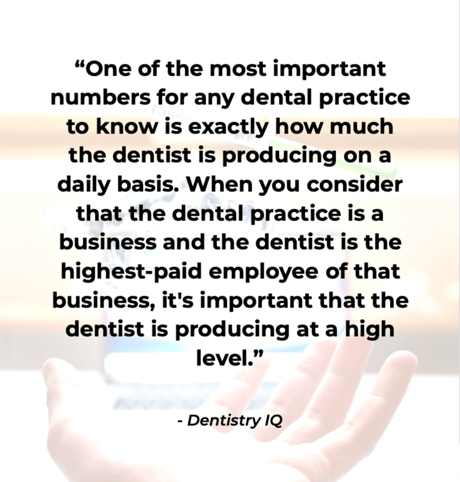
Each doctor’s net production divided by the days each doctor works. That’s how you determine each doctor’s daily average.
Do you also know the average number of patients per dentist per day?
Where are your new patients coming from? Ask yourself where your new patients are coming from. Which sources are referrals from Google versus a friend?
Set monthly goals on new patient acquisition to understand where they are coming from. If you find that your referrals from patients are low, this may be an indicator that your patients don’t feel they can refer you to friends and family - or that you should be asking them to refer more often. If you’re not getting enough referrals, use digital marketing tactics to generate referrals online or set up a strategy to bring in referrals through your patients and employees.
How many do I need? Total office production divided by 4,500 gives you a good baseline.
Remember, keep your finger on the pulse of your practice. These are just a few numbers we look at when developing a plan to increase the overall value. Buyers looking to purchase your dental practice want to know how healthy your business is, and each of these numbers helps to build that picture.
Knowing the health of your practice gives you the knowledge, awareness and drive to make changes to make improvements before you sell. It also helps defend a high value.
Who does your professional team consist of? When you want to sell your dental practice, it’s important to have a team that is well-versed in the dental industry. Ultimately, this makes the entire process run smoother.
An experienced dental broker, CPA, lawyer, and banker will help both parties avoid common setbacks and ensure that needs, concerns, and interests are better represented in a timely manner.
To put it simply, a dental broker is professional who guides you through every step in the transition process of a dental practice. A broker has undergone training that makes them an expert in taking you through every moment of the transition—including valuing a dental practice, purchasing or selling, and the transition that takes place from one owner to another. In short, they’re your mentor through the transition from start to finish. You’ll get a trained professional who can handle as much or as little as you want them to for your dental practice transition.
Remember, you will also need legal documents in place and generally your broker does not do that. For that you will need a lawyer. Look for a non-biased broker who will work only for you. Some brokerage companies may have conflicts. Does your broker have monetary interest in who buys your practice? They shouldn’t. You want an independent broker who will look out for your interests only.
In short, your certified public accountant handles all things financial for your business and they should always be consulted in financial decisions. While you could get a standard CPA, a dental-specific CPA will help you answer critical questions around your practice’s health, pull insights from other dental clients or help you understand the right time to expand your practice. It’s important to understand the knowledge from professionals in your industry to avoid mistakes and make good financial decisions. You can find a dental CPA on the directory at www.ADCPA.org.
Your legal team should approach the transition from the point of being a facilitator. They have an ethical duty to protect you, but if your goal is to sell, be sure to let your attorney know that, so that they may act accordingly.
Now that you understand who your team members are, it’s time to find them or work with a company that can help you build your own team. Once you find your team… set up a consultation with them!
This brings us to the next chapter.
In this step, you’ll want to set up a consultation with your transition team.
It’s important that you set a goal time frame and then create your transition plan.
Your transition plan is created to help keep you on track. Ideally, implementing a thorough plan that includes consults and efficiency systems 1-3 years before a sale can help you get the highest possible value for your practice. It is never too late to make these positive changes.
The projected value of your practice is based on various factors. Your main goal is to BOOST those factors to increase your numbers, and increase the value of your practice.
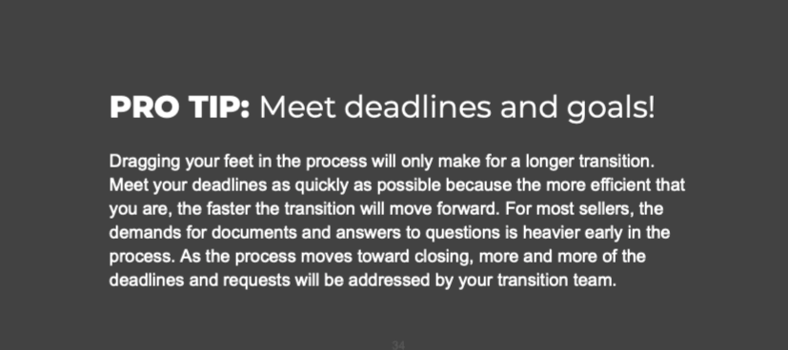
A practice appraisal is a close look into the numbers of your practice, with the intention of accurately placing a market value on it. An appraisal is a way to listen to the heartbeat of your practice in order to evaluate its health. The healthier the practice, the larger the return when you choose to sell or seek out a loan for upgrades to your growing practice.
It is easy to see why keeping an eye on your practice numbers through a trusted appraiser like JPA Dental Transitions is so important. In order to achieve your goals, you must first know how your practice numbers are trending.
Remember general evaluations are your guide to pricing and should only be used as an estimate. Your appraisal by a qualified appraiser, on the other hand, is a definitive value of your practice.
In this chapter, we’re going to talk about the different types of appraisals and valuations.
You want to make sure you receive fair evaluation for the obvious assets, as well as, the work you put into building it. Hire dental brokers that have a keen eye and can provide accurate assessments and evaluations for any dental practice.
Here is a list of some of the factors we take into consideration when valuing a dental practice:
Go to the “knowing your numbers” section in Chapter 5 to see what factors affect your valuation.
A cash flow evaluation is an effective tool for gaining a quick, inexpensive idea of what your practice may sell for on the open market. By analyzing practice production reports and profit and loss statements, adjusting the overhead by removing discretionary spending, and finding the net revenues of the practice, we can efficiently determine a practice value. One that is supported by the local market as well as the net revenues of the practice, after debt service.
A standard practice appraisal is an appropriate way to establish a practice’s value in a multitude of situations. A doctor looking to determine the value of their practice for the purposes of selling or for financial planning reasons may choose to request a standard appraisal. Similarly, prospective buyers may request a standard appraisal to gain in-depth insights into the practice.
A standard practice appraisal differs from a cash flow evaluation in that multiple industry standard valuation methods are utilized, as well as, a site visit and a final appraisal report, outlining the valuation methods which were used in arriving at the final value.
A standard valuation offers a wealth of information which is supported by an accepted methodology and should produce a hard value that is rooted in facts, and a great deal of supporting information is included.
An appraised number arrived at and produced by multiple trusted and proven methods including, but not limited to:
Support documentation for appraised value in the form of a final appraisal report:
Your results are the dollar value of your practice.
To keep the process moving along, put together your financial paperwork and make sure it’s turned in on time. When a buyer goes through due diligence, they may ask for documents such as: bank statements, number of active patients and new patients, staff compensation and benefits, plus multiple years of tax returns, production reports, profit and loss statements, etc.
Having these documents prepared not only speeds up the selling process, but it shows the buyer you are an organized individual, which makes them feel more comfortable with the purchase.
Additionally, your dental practice brokers need very specific information about your practice to effectively market to qualified buyers.
Normally, they will request multiple reports and documents from your dental practice often requiring about seven to start - to maximize their efforts. This may sound daunting, but these reports help to gauge how your dental practice is running day-to-day, what your practice's production averages are by dentist and hygienist, and fee schedules, to name a few.
You can download the list at www.jpatransitions.com/required-docs-to-list-your-practice
Remember, it can be difficult for you to gather these reports and documents and to maintain confidentiality as you may need staff assistance. You will have to use your dental software, payroll software and more to gather these reports. After all, your office manager and front desk staff normally handle these programs for you, right?
Don't worry! Here are our best tips to help you get the information you need, without alarming the office.
The challenge for most doctors in this position is pulling the reports. If you don't normally run them, some can be difficult to pull.
If you're reading this guide, you've probably already started thinking about selling (if you haven't already started the process). Now is a great time to start doing quarterly reviews with your staff, pulling the reports you will need when you sell. This way when you finally get to the stage of your dental practice transition where you need these documents, it will be a normal practice for you to pull these reports.
Dental practice brokers have different views on confidentiality - some believe you should tell your staff you are selling, and some don't. As we previously discussed in the “Maintaining Confidentiality” section of Chapter 3, we always advise maintaining confidentiality. We can help you control that process. You may be tempted to ask for help from people in your office, but before you do, contact your transition advisor. It could help save the confidentiality of your sale.
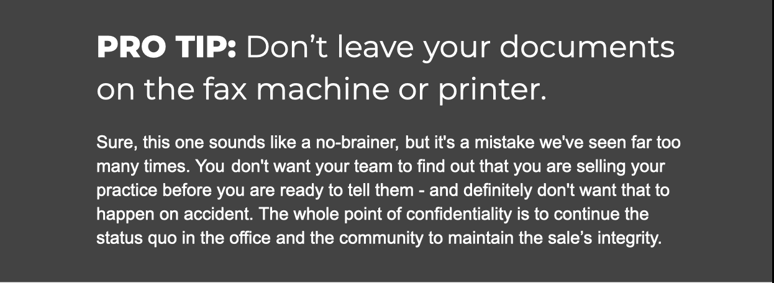
Share your list of documents with your CPA to see what he or she can provide for you before you try to find the information yourself. Your CPA can pull a lot of the financial statements your dental practice broker needs, like profit-loss statements and tax returns. They will also be very helpful in determining the overhead adjustments to be made. Make sure you use a dental specific CPA and other dental professionals who understand the process of a dental practice transition. They will be mindful of your need for confidentiality whereas outside professionals may not.
When you are communicating with your dental practice's CPA, broker and other professionals on your transition team, use your personal email and phone number. You don't want someone with confidential information calling your practice and asking your front desk, "Can I speak to Dr. Smith?" Staff is savvy to anything out of the ordinary. This is especially true if your staff has your email password or access to your accounts on an office computer.
As part of listing and marketing your practice, you should have completed all of the documents in the previous step. But here are some ideas to help you list and market your practice.
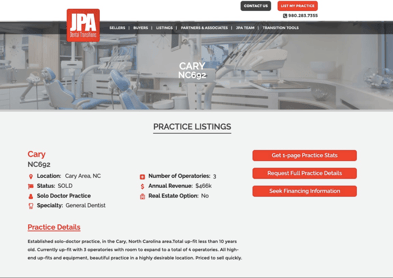
When selling your practice, there are a couple of routes you (or if listing with a broker, your broker) can take to
market it. This can include advertisements, website listings, online marketing, and association websites (which needs to be done in a confidential manner, of course).
Additionally, at JPA, we list your practice directly on our site. We have a database of hundreds of buyers which will help you sell your practice fast.
Ready to show your office to a potential buyer? Did you receive an offer? What’s next? Once you receive an offer on your practice, engage with the rest of your professional team. Look to them for guidance and review the offer. Then, accept it or counter back in a timely manner.
Once the offer is accepted, it’s important that your team sets a FIRM closing date. This keeps both teams aligned.
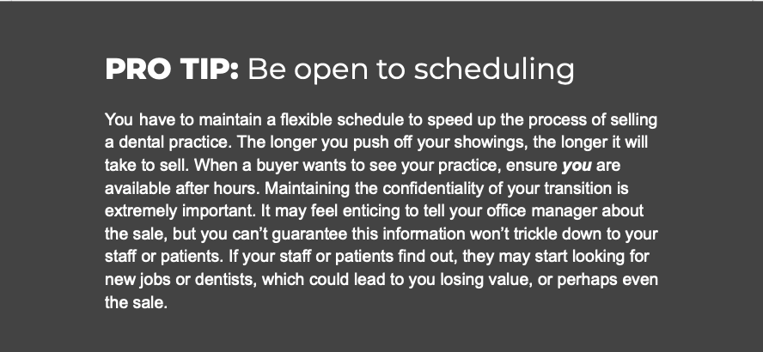
Showings should be a laid back chance for the buyer and seller to discuss practice philosophy, general questions and information, and other items of concern for the buyer. There should not be open negotiations about sale price or other points for the transition at the initial showing.
If you aren’t available for showings, be prepared for a longer selling process. And remember - time kills all deals.
After a successful showing, interested buyers generally submit an offer. This is the time to discuss the offer with your broker and CPA. Is it a good offer? Is there some give and take? Are you going to counter or accept? Remember if you counter, do it quickly and have a basis on why.
If you are ready to accept, congrats!
When you’re working through your due diligence items, be an open book. At this point, the buyer has signed an NDA and should have the keys to the kingdom with regards to anything business-related.
After your accepted offer, things really start to move--and move fast! It’s time to prepare, negotiate and review closing documents.
The dental broker and advisors will begin the negotiation process on your behalf; going back and forth with the other party and their advisors until an agreement can be reached. This will ensure that you receive the best deal possible through skilled negotiation tactics.
At that point, legal contracts have to be drawn up to consummate the ownership transfer. Some brokers provide specimen contracts to use, but your professional legal team will need to review these contracts (no matter who provided them). Make sure you fully understand what the contract entails so you can make an educated decision for your dental practice transitions.
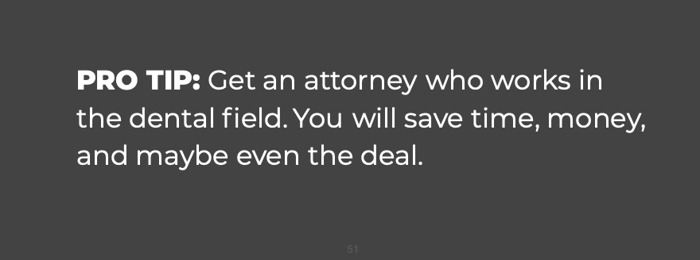
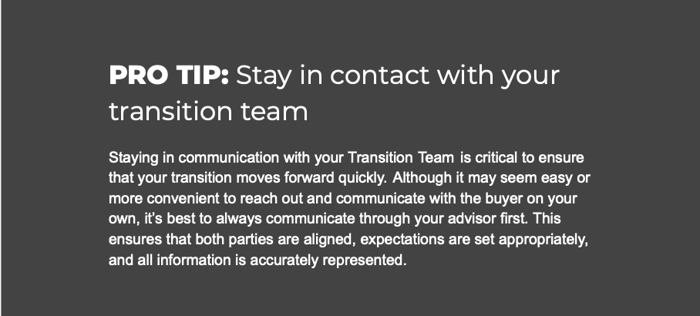
You’re almost there! Here is what you need to handle in the last 2 weeks of your transition.
Closing on a dental practice is similar to closing on a house. The day of closing will be busy and emotional, so expect some issues.
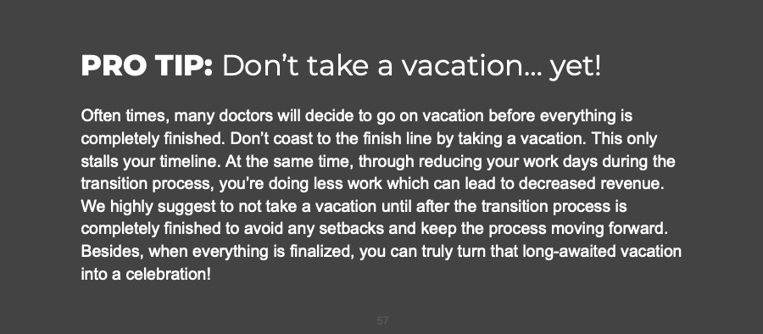
Once the practice has closed, congratulations, you are not the owner anymore! You may be having mixed feelings but don’t worry, the process isn’t quite over. There are more activities that come along with transitioning your practice.
Once the sale is completed, then comes the transition phase. It can seem overwhelming getting everything in order to hand off to the buyer, but don’t worry — your broker has you covered.
We facilitate the transitions by making sure the buyer has everything they need to be successful with the dental practice. We also make sure the seller has taken care of all their legal obligations. The dental staff and the patients of the practice need to feel like operations are continuing smoothly—and we’ll make sure that happens for you.
We know it can be hard to imagine life after practicing. That’s why we want to ensure you have a successful transition. We work hard so you never have to worry about the confidentiality of your sale, professionalism in vetting potential buyers, or maximizing your return on investment. With some planning, and the right team on your side, you’ll successfully make it through the transition process!
 100 Glenway St. | Suite F | Belmont, NC 28012
100 Glenway St. | Suite F | Belmont, NC 28012

All ADS companies are independently owned and operated
JPA Dental Transitions © 2019. All Rights Reserved. Website & Marketing by Laire Group